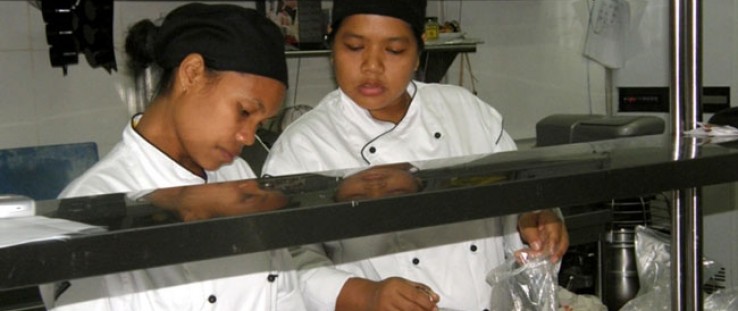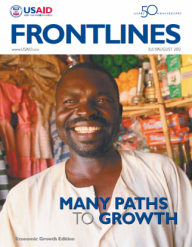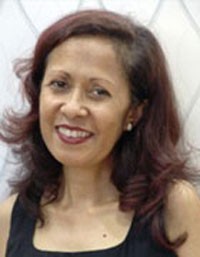 Ana Florinda da Costa (left), 25, who got her job through a USAID internship program, works with a colleague at the Discovery Inn in Timor-Leste.
credit: Antonio Gusmao, DAI/SGP
Ana Florinda da Costa (left), 25, who got her job through a USAID internship program, works with a colleague at the Discovery Inn in Timor-Leste.
credit: Antonio Gusmao, DAI/SGP
 Ana Florinda da Costa (left), 25, who got her job through a USAID internship program, works with a colleague at the Discovery Inn in Timor-Leste.
credit: Antonio Gusmao, DAI/SGP
Ana Florinda da Costa (left), 25, who got her job through a USAID internship program, works with a colleague at the Discovery Inn in Timor-Leste.
credit: Antonio Gusmao, DAI/SGP
Every morning, I am greeted by the local gardener, Guilherme, who busily tends half-broken trees and overgrown bushes, planting seeds in the modicum of soil available in the suburbs of Dili, the capital of Timor-Leste. Hopefully, the seeds will bring new life to a city that had been almost wholly destroyed in 1999, devastated by war and cyclical instability. Salutations are brief.
In early 2008, Guilherme said to me: “Minister, we are not producing; bellies will not be full come rainy season.”
He knew what I knew: Food security and peace go hand in hand.
As I entered the office that day, I asked my chief economist to look up the price of rice. He returned ashen-faced bearing the bad news: The price of rice had risen 218 percent. With a reduction in domestic production and rice imports rising, our budget was now in shambles. This is what the international community calls an “external shock.” As minister of finance, I call it “being in shock,” a state I have come to know well since coming into office on August 8, 2007.
One day one of my mandate as minister, I walked into the Ministry of Finance with no handover, no functioning computers that could spit out the kind of standard information ministers of other nations would expect, and a highly politicized public service that was deeply loyal to the previous ruling party. I admit I was never trained in how to “rule”; I am a technocrat with a background in public service. We were a government formed to serve.
In 2007, we started identifying national priorities and insisting that donors align and harmonize with those national priorities. Within two years, we had reduced poverty by 9 percent. These are results achieved for our people. These are the results of true development partnerships.
In 2011, Timor-Leste launched the Strategic Development Plan 2012–2030. We rifled through some 4,000 reports written on and about Timor-Leste over the past decade, and to our surprise, not one cross-sector analysis had been done on how to build the nation or what the global costs would be in a state the size of a small town in the United States. Not one town-planning document for the capital had been developed.
We wanted to know [the answer to] one simple question. How much will it cost to create the basic and core infrastructure for Timor-Leste? Not one donor, international partner, or government office had coordinated the most basic of information. This should cause a moment of pause for any partner in development. Why have we not gotten the basics right? Data, planning, alignment, interventions?
When I look at my own country, in many ways we are starting from the beginning and are lucky to have established one of the best resource petroleum funds that will benefit our people now and in the future. Internationally, we are recognized for our revenue transparency; however, that level of transparency must start at the global level.
We went from being a failed state to being one of the top-10 fastest-growing economies in the world. It is a success story because of inclusive politics, because we, as a nation, fought a common enemy—poverty—and we made our national motto “Goodbye Conflict, Welcome Development.”
From the smallest village to the city centers, our people were looking to the future with this phrase and with economic and social policies reigniting hope. It was their united will that brought peace and stability. When the United Nations handed over primary policing responsibilities to the Timorese police, there was no increase in crime. This was a benchmark that trust and confidence had been earned, and communities were normalized to a new way of life.
Recently in a g7+ meeting, my colleague from South Sudan said, “Nothing about us, without us.” I echo his sentiment. There should be no more policy where we are not at the table, no more research where we cannot contribute, no more forums where we are not offered a seat. And every “G” meeting should embrace our little “g” because we represent the largest population of the globe, but also the most vulnerable, and we deserve the opportunity to contribute to peacebuilding for all regions and continents.
One day, I asked Guilherme the gardener about the fruit in Timor-Leste. He said that the banana was the most common fruit but that durian was the most coveted. From that advice, I created the “Banana Show” for my cabinet members to target the success of budget execution. Every minister had to hit a certain budget execution rate that was associated with a Timorese fruit, banana being common (less than 25 percent), papaya the next higher (between 26 percent and 50 percent), with the durian being outstanding (above 75 percent execution rate). The Banana Show would be transparently published in the local paper for our people to judge the performance of their government.
Through humor, good will, a common purpose and a little innovation, the Banana Show became legendary. Budget execution was the highest ever, rising from 49 percent when we came into office, reaching 89 percent and continuing to progress on increased budget amounts. It worked.
Soon after the day I had learned of skyrocketing rice prices, we were one of the first countries to set up an economic stabilization fund. The international community said it was not the right thing to do and accused us of intervening in the private sector by subsidizing the purchase of rice. However, we had enough rice for our people come rainy season and every season thereafter. A year later, we witnessed one of the largest interventions into the market in world history with the U.S. banking sector. I was not surprised. Right or wrong, governments, either from fragile nations or world powers, must often make difficult decisions for their people.
The very same people who criticized the Timor-Leste economic stabilization fund offered an apology. I accepted.
Now, I am not sure if Guilherme the gardener ever knew that I listened so much, but this is inclusive politics on the local level. As for the global level, Guilherme can teach us this: Listening and planting seeds to grow, even in the most arid places where you think they could never grow, is worth the risk … and Timor-Leste is an example.
This essay originally appeared in longer form in USAID's Frontiers in Development Publication [pdf].










Comment
Make a general inquiry or suggest an improvement.